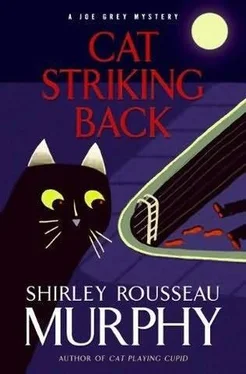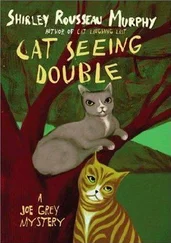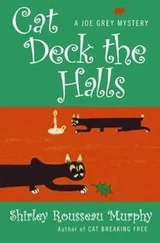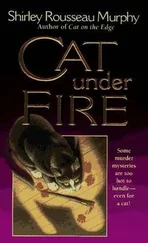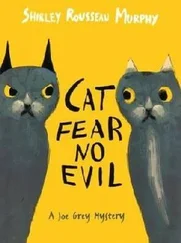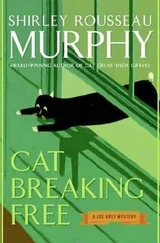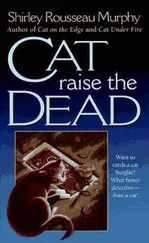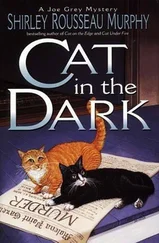As Max turned onto the freeway, Charlie said, “John Bern says Frances has been dead at least thirty-six hours. When Ryan talked with Ed Becker this morning, he told her that her call woke Frances.”
“What is he going to do, tell her Frances can’t come to the phone right now because she’s dead?” He flicked on his emergency flashers to get a car off their tail, watched the guy pass on their left. The driver wouldn’t take such a liberty if they were in a patrol car. “If Becker turns out to be the burglar as well, then he apparently changed cars, switched to the dark RV. He could have put the jewelry and paintings in Frances ’s Accord, but not the furniture and boxes of books.” He looked over at Charlie. “Switched cars, hid the Accord somewhere, maybe in a storage unit or rented garage.”
Charlie tried to remember if Frances had ever mentioned a locker or a rented garage. But if Ed was stealing, surely she didn’t know about it. Did they own a rental house somewhere, and he’d stashed the car there? That didn’t seem likely when they’d lived in Molena Point only about two years. “Maybe there was a storage unit, maybe they still have unpacked boxes, maybe part of Frances ’s furniture collection. But if Ed was the burglar…” She looked at him, frowning. “He loaded up all that furniture from his own house to throw you off the track?”
Max shrugged. “Again, what else could he do?” They were turning off the freeway toward home when her phone buzzed. It was Ryan.
“We’re just getting back from the morgue,” Charlie told her. “I won’t turn the speaker on, there’s too much traffic noise. The dead woman is Frances Becker. You want to tell… Clyde?” Meaning, Will you tell Joe Grey? She knew the cats would be grieving for Theresa.
Ryan said, “They just walked in, all three of them, grinning like Cheshire cats.” And, more softly, “They were there when Max called the station.”
Charlie hid her smile.
Ryan said, “You want to run down here for supper? Beans and corn bread, and we’ll show you pictures of the house we’ve decided on.”
Charlie covered the phone, looking at Max. “Go down for a quick supper?” In truth, she didn’t feel like eating, she wasn’t sure she’d ever eat again, not sure her mouth would ever stop tasting like something dead.
But maybe a comforting meal of beans and corn bread would stay down. When Max nodded, she said, “We’ll just run by home and take care of the horses, we won’t be long.” Part of her would like to stay home, but she wanted, even more, to reassure the cats that indeed Theresa was just fine. Approaching the village, Max turned up the hills toward the ranch; the minute they turned into their long private road, the two big dogs saw them from the pasture and came barking, racing along inside the fence. The four horses galloped beside them, all of them wanting supper.
While Max fed the livestock, Charlie hurried to brush her teeth and lay out clean clothes. She took a quick shower and washed her hair, pinning it back wet. Max showered and changed, they threw their clothes in the washer and were out again in half an hour, headed for the village in the truck, leaving the Blazer in the stable yard with all the windows rolled down, hoping the sea wind would sweeten that clinging smell.
The village streets at dinnertime were busy with tourists crossing back and forth looking in shop windows or pausing before the small restaurants, reading the posted menus. Turning down the Damens’ street and parking, they caught the comforting scent of Clyde ’s favorite bean recipe. Wilma’s car was parked in the drive beside the Greenlaws’ gray sedan. “What’s this?” Max said. “I thought we were just running down for a quick bite.”
“I don’t know,” she said innocently. Because Dulcie and Kit were here, it would have been only natural for the Damens to invite the cats’ housemates. Rock barked at the door to greet them, and Clyde handed them each a beer. Everyone was gathered around the fire, the three cats sprawled on the mantel, warming themselves safely above the cozy blaze. Charlie paused to stroke them. They smiled up at her, their eyes filled with delight that Theresa was alive. They might feel sad for Frances, but not as sad as if they were grieving over their real friend. In front of Max, Charlie could say nothing, she stood petting them, trapped in one of those maddening moments when she and the cats longed to talk, but could say not a word. Of everyone present, it was only Max-the most keenly attuned to the subtleties of body language and behavior-who didn’t know the truth.
EIGHTY MILES NORTH of Molena Point, traveling the narrow two-lane along the edge of the cliff high above the Pacific, there was hardly any traffic. Above him the sky was clear, not a cloud, just the way he liked it-except that the sea was too bright, its flat surface metallic with reflected sun, that shot through the windshield at an angle that he couldn’t block with the visor.
The road was so narrow that when an occasional car did approach him, he had to press the RV precariously close to the rocky cliff that rose jaggedly on his right. His face hurt like hell and he kept thinking about infection. Cats were dirty creatures, and he was sure there was still glass embedded in the wounds, so deep he might never get it out. Every few miles he checked himself in the mirror to see if he was bleeding again. He’d put flesh-colored Band-Aids on only the worst wounds, otherwise his whole face would be covered. He felt better, though, with some breakfast in him.
In the steamy, boxlike restaurant with its dark-stained plywood walls smelling of the fishing wharf, he’d ordered ham, three eggs over easy, potatoes, and three biscuits, washing it all down with a big carafe of coffee. His bandages and bloody scratches had gotten wary looks from the half dozen tourists sitting in the plywood booths. One skinny woman in a purple sweater had looked so shocked that she half rose to leave, then glowered at her husband when he pulled her back into the booth. Two locals at the counter-wizened old men dressed in leathers that stunk of fish, their faces wrinkled and dark from sea and sun, had given him darkly amused stares. Both of them were drinking beer that was colored pink by the red wine they’d poured into it. Four empty wineglasses were lined up precisely beside their beer bottles. The waitress, an overweight redhead with a checkered apron pulled tight over her belly, took one look at him and asked, smartly, if he’d been in a catfight. He’d eaten quickly, didn’t tip her, paid his bill, and left.
Now, moving north up the precarious coastal two-lane, he glanced at his watch. One thirty. Not too bad considering how late he’d slept. He’d be in the city by three, unload the goods with the fence. Be out of there with the money and on the road again with plenty of time to dump the RV, leaving it on some back street where the homeless would strip it to sell for parts. Plenty of time to catch a bus to the nearest out-of-the-way car lot, some small operation where the salesman wouldn’t get fidgety if he paid in cash. Pick up a nondescript vehicle and head on north.
If he was ever questioned about the car that was now in the rented garage outside Molena Point, he’d say she took it when she ran off and left him. That he didn’t know why she’d taken it back there. He could get rid of it later, slip back into the village, drive it off to some chop shop.
As he plied the narrow highway north of Half Moon Bay, most of the sparse traffic was moving south, hugging the road above the sheer drop, detained from some fatal misjudgment only by occasional short lengths of guardrail. He kept the windows open, letting the cool, damp air soothe his burning face. The echo of the sea far below crashing against the rocks pleased him, he liked its wildness, he liked the thrill of danger. It was the same as the thrill of their thefts, they skirted the edge but always moved on unharmed. She’d loved that, loved the excitement that they could get caught but never did. She’d loved selecting their targets beforehand from within an intimate group, she’d loved their duplicity. She was the one who insisted they slip away with only the items she’d chosen and take nothing else. They’d had a good thing going. Live in a neighborhood a few years, get cozy with the neighbors, join the local organizations, go to the concerts and amateur plays, even the school functions when the neighbors’ kids were involved-that was key, getting involved. During that time while they were settling in, listening to their neighbors’ problems and sometimes trying to help, babysitting their kids, they could often pull a few jobs in some previous neighborhood if it was close enough. Pick a time when there was a funeral or a wedding that would involve most of the residents. Then afterward allow enough time to lapse so everyone grew complacent again, thinking the thieves had moved on. They had done this on the East Coast, too, before they’d come out to California. To rip off their adopted neighborhood, that was the thrill, and they’d planned their moves carefully.
Читать дальше
